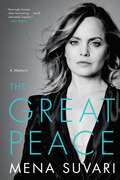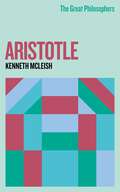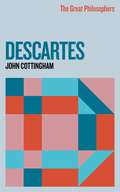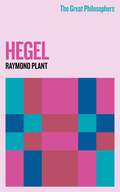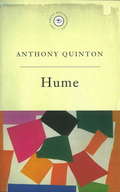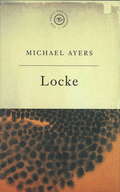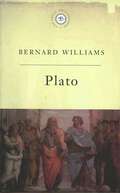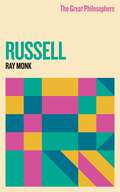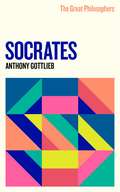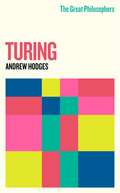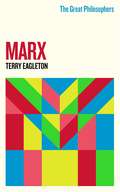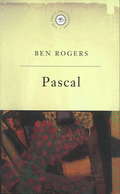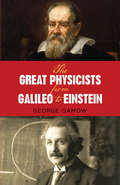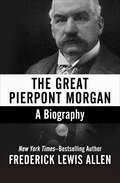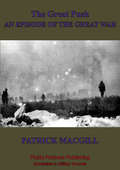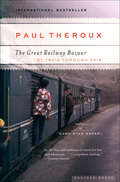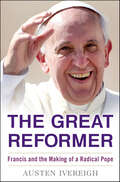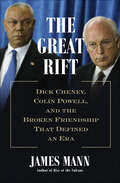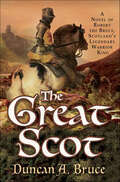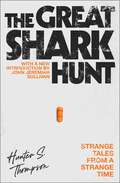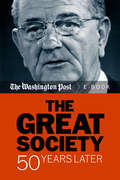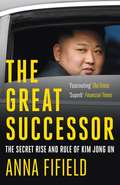- Table View
- List View
The Great Peace: A Memoir
by Mena SuvariA memoir by award-winning actor Mena Suvari, best-known forher iconic roles in American Beauty, American Pie, and Six Feet Under.The Great Peace is a harrowing, heartbreaking coming-of-age story set in Hollywood, in which young teenage model-turned-actor Mena Suvari lost herself to sex, drugs and bad, often abusive relationships even as blockbuster movies made her famous. It's about growing up in the 90s, with a soundtrack ranging from The Doors to Deee-Lite, fashion from denim to day-glo, and a woman dealing with the lasting psychological scars of abuse, yet knowing deep inside she desires so much more from life.Within these vulnerable pages, Mena not only reveals her own mistakes, but also the lessons she learned and her efforts to understand and grow rather than casting blame. As such, she makes this a timeless story of girl empowerment and redemption, of somebody using their voice to rediscover their past, seek redemption, and to understand their mistakes, and ultimately come to terms with their power as an individual to find a way and a will to live—and thrive. Poignant, intimate, and powerful, this book will resonate with anyone who has found themselves lost in the darkness, thinking there's no way out. Ultimately, Mena's story proves that, no matter how hopeless it may seem, there's always a light at the end.
The Great Philosophers: Aristotle
by Kenneth McleishAristotle c. 384- c.322 BCThe ideas Aristotle outlined in his Poetics have formed the foundation for the whole history of western critical theory. No work has had more influence upon the literature of centuries - neither has any been so profoundly, so perversely misunderstood.Mystification, moralization, recruitment into the cause of this or that literary culture... with all the interpretations, Aristotle has too seldom been permitted to speak for himself. If the prescriptive rigidities of the Renaissance went entirely against the grain of his open, accepting empiricism, the psychologising mania of the moderns has been no truer a reflection of his thought.Kenneth McLeish's introduction cuts through centuries of accreted obscurity to reveal the forthright, astonishingly original book which Aristotle actually wrote. The philosopher who emerges proves more 'modern' than any of his interpreters.
The Great Philosophers: Descartes
by John CottinghamRené Descartes 1596-1650The 'father of modern philosophy', René Descartes has been accorded all the admiration a father customarily receives - and all the resentment.That mind-body duality by which he so deftly made sense of us now seems less paradigm than prison. And yet, to unthink it appears impossible. For better of worse, Descartes must remain our starting-point in the attempt to understand ourselves and our relation to our world.Yet if the problems begin with Descartes, so too may some of the solutions. John Cottingham's fascinating guide finds in the French philosopher's own neglected later work some intriguing hints as to how the stumbling-blocks might be surmounted. The father of modern philosophy, it seems, might yet be his child's deliverer.
The Great Philosophers: Hegel
by Raymond PlantPart of the GREAT PHILOSOPHERS series.G.W.F. Hegel 1770-1831Without Hegel, modern thought is unthinkable. From Marx to Merleau-Pontyh, from Kierkegaard to Nietzsche, those whose ideas have made the modern age have all worked in his shadow.For Hegel's preoccupations have turned out to be our own. The isolation of the individual adrift in society, the yearning of the divided self for an integrated wholeness: these are anxieties his successors have shared. The rival claims of the personal and the public, the immediate instant and the wider historic narrative: these have remained pressing problems through two hundred years of change.Yet if his 'philosophy' seems as contemporary as ever, Hegel's 'religious' views have been dismissed as irrelevant anachronism. The distinction is false, however. In his theological explorations, suggests Raymond Plant in this illuminating new guide, Hegel tackled the issues of interest to us all.
The Great Philosophers: Hegel (GREAT PHILOSOPHERS)
by Raymond PlantPart of the GREAT PHILOSOPHERS series.G.W.F. Hegel 1770-1831Without Hegel, modern thought is unthinkable. From Marx to Merleau-Pontyh, from Kierkegaard to Nietzsche, those whose ideas have made the modern age have all worked in his shadow.For Hegel's preoccupations have turned out to be our own. The isolation of the individual adrift in society, the yearning of the divided self for an integrated wholeness: these are anxieties his successors have shared. The rival claims of the personal and the public, the immediate instant and the wider historic narrative: these have remained pressing problems through two hundred years of change.Yet if his 'philosophy' seems as contemporary as ever, Hegel's 'religious' views have been dismissed as irrelevant anachronism. The distinction is false, however. In his theological explorations, suggests Raymond Plant in this illuminating new guide, Hegel tackled the issues of interest to us all.
The Great Philosophers: Hume
by Anthony QuintonA short book combining extracts from the work of one of the world's greatest thinkers with commentary by one of Britain's most distinguished writers on philosophy.
The Great Philosophers: Locke (GREAT PHILOSOPHERS)
by Michael AyresPart of the GREAT PHILOSOPHERS series.John Locke 1632-1704What Newton did for physics in the seventeenth century, Locke did for philosophy. The revolution wrought by these two giants established the intellectual underpinnings of the modern world.Yet out own age has called their contributions into question. While Newton's universe has come to seem unduly mechanistic, Locke has been out of favour for his wordy rhetoric, the apparent imprecision of his thought and the perceived irrelevance of his once-radical empiricism.This fascinating guide restores an underrated thinker to his rightful place at the very centre of modern philosophical enquiry. Basing his exposition upon a resourceful re-reading of An Essay concerning Human Understanding, Michael Ayers explains the historical significance of Locke's philosophical project, and its continuing capacity to challenge and compel.
The Great Philosophers: Plato (GREAT PHILOSOPHERS)
by Professor Bernard WilliamsPlato c428 - c348BCWithout the work of Plato, western thought is, quite literally, unthinkable. No single influence has been greater, in every age and in every philosophic field. Even those thinkers who have rejected Plato's views have found themselves working to an agenda he set.Yet between the neo-platonist interpretations and the anti-platonist reactions, the stuff of 'Platonism' proper has often been obscured. The philosopher himself has not necessarily helped in the matter: at times disconcertingly difficult, at other disarmingly simple, Plato can be an elusive thinker, his meanings hard to pin down. His dialogues complex and often ironically constructed and do not simply expand his views, which in any case changed and developed over a long life.In this lucid and exciting new introductory guide, Bernard Williams takes his reader back to first principles, re-reading the key texts to reveal what the philosopher actually said. The result is a rediscovered Plato: often unexpected, always fascinating and rewarding.
The Great Philosophers: Russell
by Ray MonkBertrand Russell 1872-1970Bertrand Russell discovered mathematics at the age of eleven. It was, he recalled, a transporting experience: 'as dazzling as first love.'From that moment on, he would pursue his passion with undying devotion and all but erotic fervour. Mathematics might succeed, he felt, where philosophy had failed, reducing thought to its purest form, and freeing knowledge from doubt and contradiction.And so, for a time, it seemed. Russell's mathematical investigations effortlessly resolved at a stroke some of philosophy's most intractable problems. Yet if mathematics could be a liberating mistress, she was an unreliable one...Opening up the work of one of our age's undisputed giants, Ray Monk's exhilaratingly clear, readable guide tells a compelling human tale too: a moving story of love and loss, of ecstatic triumph and deep disillusion.
The Great Philosophers: Russell (GREAT PHILOSOPHERS)
by Ray MonkBertrand Russell 1872-1970Bertrand Russell discovered mathematics at the age of eleven. It was, he recalled, a transporting experience: 'as dazzling as first love.'From that moment on, he would pursue his passion with undying devotion and all but erotic fervour. Mathematics might succeed, he felt, where philosophy had failed, reducing thought to its purest form, and freeing knowledge from doubt and contradiction.And so, for a time, it seemed. Russell's mathematical investigations effortlessly resolved at a stroke some of philosophy's most intractable problems. Yet if mathematics could be a liberating mistress, she was an unreliable one...Opening up the work of one of our age's undisputed giants, Ray Monk's exhilaratingly clear, readable guide tells a compelling human tale too: a moving story of love and loss, of ecstatic triumph and deep disillusion.
The Great Philosophers: Socrates (GREAT PHILOSOPHERS)
by Anthony Gottlieb'If you put me to death,' Socrates warned his Athenian judges, 'you will not easily find anyone to take my place.' So indeed it would prove, a single cup of hemlock robbing the western philosophical tradition of the man with best claims to be its founding father.Yet Socrates' influence was not so easily to be done away with. His words lovingly recorded by his devoted disciple Plato, his doctrines reached a posterity which has, through twenty-seven centuries now, taken him as its teacher.The marriage of idealism and scepticism in his though; his sense of education as self-discovery; his view of philosophy as preparation for life: these have been the stuff of western thought at its best. So completely did Socrates embody these values, he was prepared to die in their defence...
The Great Philosophers: Turing (GREAT PHILOSOPHERS)
by Andrew HodgesAlan Turing's 1936 paper On Computable Numbers, introducing the Turing machine, was a landmark of twentieth-century thought. It settled a deep problem in the foundations of mathematics, and provided the principle of the post-war electronic computer. It also supplied a new approach to the philosophy of the mind.Influenced by his crucial codebreaking work in the Second World War, and by practical pioneering of the first electronic computers, Turing argued that all the operations of the mind could be performed by computers. His thesis, made famous by the wit and drama of the Turing Test, is the cornerstone of modern Artificial Intelligence.Here Andrew Hodges gives a fresh and critical analysis of Turing's developing thought, relating it to his extraordinary life, and also to the more recent ideas of Roger Penrose.
The Great Philosophers:Aristotle (GREAT PHILOSOPHERS)
by Kenneth McleishAristotle c. 384- c.322 BCThe ideas Aristotle outlined in his Poetics have formed the foundation for the whole history of western critical theory. No work has had more influence upon the literature of centuries - neither has any been so profoundly, so perversely misunderstood.Mystification, moralization, recruitment into the cause of this or that literary culture... with all the interpretations, Aristotle has too seldom been permitted to speak for himself. If the prescriptive rigidities of the Renaissance went entirely against the grain of his open, accepting empiricism, the psychologising mania of the moderns has been no truer a reflection of his thought.Kenneth McLeish's introduction cuts through centuries of accreted obscurity to reveal the forthright, astonishingly original book which Aristotle actually wrote. The philosopher who emerges proves more 'modern' than any of his interpreters.
The Great Philosophers:Marx
by Terry Eagleton'We are free when, like artists, we produce without the goad of physical necessity' Karl MarxFor Marx, freedom entailed release from commercial labour. In this highly engaging account, Eagleton outlines the relationship between production, labour and ownership which lie at the core of Marx's thinking. Marx's utopia was a place in which labour is increasingly automated, emancipating the wealth of sensuous individual development so that 'savouring a peach [is an aspect] of our self-actualisation as much as building dams or churning out coat-hangers'. Combining extracts from Marx's revolutionary philosophy, along with insightful analysis, this is the perfect guide to one of the world's greatest thinkers.
The Great Philosophers:Pascal (GREAT PHILOSOPHERS)
by Ben RogersPascal 1623-1662The moralist who advocated dressing up, the ascetic who liked a flutter, the devout Christian who lauded vanity, Pascal is a funnier, more ironic philosopher than his reputation as an anguished existentialist would suggest.Yet however irreverent the terms of his ironic project, its underlying impetus is both serious and profound. In this superb new introduction to the thinker and his thought, Ben Rogers demonstrates the deep wisdom of Pascal's defence of popular folly - a defence which he used to highlight the higher delusions of the learned.Setting the Pensées in the context of Pascal's life and philosophical career, Rogers reveals how their apparent frivolity underpins a fascinating, far-reaching and still challenging body of moral and political thought. His remarkable guide offers an eye-opening account of the work of a marvellous and much neglected thinker.
The Great Physicists from Galileo to Einstein
by George Gamow"This book is Gamow at his best, which means the very best in science for the layman." -- Library JournalWidely recognized as one of the 20th century's foremost physicists, George Gamow was also an unusually capable popularizer of science. His talents are vividly revealed in this exciting and penetrating explanation of how the central laws of physical science evolved -- from Pythagoras' discovery of frequency ratios in the 6th century B.C. to today's research on elementary particles.Unlike many books on physics which focus entirely on fact and theory with little or no historic detail, the present work incorporates fascinating personal and biographical data about the great physicists of past and present. Thus Dr. Gamow discusses on an equal basis the trail of Galileo and the basic laws of mechanics which he discovered, or gives his personal recollections about Niels Bohr along with detailed discussion of Bohr's atomic model. You'll also find revealing glimpses of Newton, Huygens, Heisenberg, Pauli, Einstein, and many other immortals of science.Each chapter is centered around a single great figure, or at most two, with other physicists of the era and their contributions forming a background. Major topics include the dawn of physics, the Dark Ages and the Renaissance, Newtonian physics, heat as energy, electricity, the relativistic revolution, quantum theory, and the atomic nucleus and elementary particles.As Dr. Gamow points out in the Preface, the aim of this book is to give the reader the feeling of what physics is, and what kind of people physicists are. This delightfully informal approach, combined with the book's clear, easy-to-follow explanations, will especially appeal to young readers but will stimulate and entertain science enthusiasts of all ages. 1961 edition."The whole thing is a tour de force covering all the important landmarks." -- Guardian
The Great Pierpont Morgan: A Biography
by Frederick Lewis AllenA revealing biography of J. P. Morgan, one of the most powerful and enigmatic financiers in history, from bestselling author Frederick Lewis Allen. Celebrated as a titan of industry by some and decried as a monopolizing robber baron by others, John Pierpont Morgan was without a doubt a dominant player in American finance at the turn of the twentieth century. He founded U.S. Steel, a conglomeration of leading steel and iron producers, which was the nation&’s largest coast-to-coast railroad system, and the first company to be worth more than $1 billion. Morgan was also instrumental in developing the Federal Reserve after working with political leaders to prevent a potentially devastating fiscal crisis in 1907. Indeed, he was a driving force in the modernization of American business, and the effects of his acumen and foresight continue to resonate today—on Wall Street and beyond. Additionally, known for his displays of wealth and power, Morgan was a prominent figure of the New York society scene—a member of the original one percent—as well as a notable art connoisseur with a sizable collection now housed in Manhattan&’s lavish Morgan Library & Museum, once his own private library. In this meticulously researched and comprehensive biography, Frederick Lewis Allen, former editor of Harper&’s magazine and author of Only Yesterday, delves into the life and character of a fascinating, multidimensional man. Allen also probes the evolution of the business landscape during Morgan&’s lifetime, when giant corporations with unparalleled economies of scale began to absorb and replace smaller competitors. This richly detailed portrait of a man whose name is inseparable from American finance is essential reading for anyone seeking a deeper understanding of banking and business history.
The Great Push - An Episode Of The Great War
by Patrick MacgillWinner of a much esteemed star from doyen of First World War writers Cyril Falls, the author writes of the battle of Loos in 1915, particularly graphically. MacGill was actually engaged and wounded during the battle whilst serving with the London Irish Rifles."MacGill, who had won considerable fame as a writer of "navvy " romances before the War, wrote one of the most vivid English accounts of a battle that was published while it was still in progress. He used to be known as a "powerful," meaning a rather brutal writer, but a study of The Great Push beside some of the contemporary novels and narratives will show what an admirable advance in "power" has been made since then. His account covers quite a short period: the Battle of Loos with its preparatory period and its aftermath. He himself was a stretcher-bearer. He saw the famous football dribbled over by his regiment, the London Irish, and saw it afterwards deflated on the German wire. The passages describing a night in Loos and the subsequent panic are very fine." p. 215 Cyril Falls. War Books, London, 1930.
The Great Railway Bazaar: By Train Through Asia (Penguin Modern Classics Ser.)
by Paul TherouxThe acclaimed author recounts his epic journey across Europe and Asia in this international bestselling classic of travel literature: &“Compulsive reading&” (Graham Greene). In 1973, Paul Theroux embarked on a four-month journey by train from the United Kingdom through Europe, the Middle East, and Southeast Asia. In The Great Railway Bazaar, he records in vivid detail and penetrating insight the many fascinating incidents, adventures, and encounters of his grand, intercontinental tour. Asia's fabled trains—the Orient Express, the Khyber Pass Local, the Frontier Mail, the Golden Arrow to Kuala Lumpur, the Mandalay Express, the Trans-Siberian Express—are the stars of a journey that takes Theroux on a loop eastbound from London's Victoria Station to Tokyo Central, then back from Japan on the Trans-Siberian. Brimming with Theroux's signature humor and wry observations, this engrossing chronicle is essential reading for both the ardent adventurer and the armchair traveler.
The Great Reformer: Francis and the Making of a Radical Pope
by Austen IvereighA biography of Pope Francis that describes how this revolutionary thinker will use the power of his position to challenge and redirect one of the world's most formidable religionsAn expansive and deeply contextual work, at its heart The Great Reformer is about the intersection of faith and politics--the tension between the pope's innovative vision for the Church and the obstacles he faces in an institution still strongly defined by its conservative past. Based on extensive interviews in Argentina and years of study of the Catholic Church, Ivereigh tells the story not only of Jorge Mario Bergoglio, the remarkable man whose background and total commitment to the discernment of God's will transformed him into Pope Francis--but the story of why the Catholic Church chose him as their leader.With the Francis Revolution just beginning, this biography will provide never-before-explained context on how one man's ambitious program began--and how it will likely end--through an investigation of Francis's youth growing up in Buenos Aires and the dramatic events during the Perón era that shaped his beliefs; his ongoing conflicts and disillusionment with the ensuing doctrines of an authoritarian and militaristic government in the 1970s; how his Jesuit training in Argentina and Chile gave him a unique understanding and advocacy for a "Church of the Poor"; and his rise from Cardinal to the papacy.
The Great Rift: Dick Cheney, Colin Powell, and the Broken Friendship That Defined an Era
by James MannThe Great Rift is a sweeping history of the intertwined careers of Dick Cheney and Colin Powell, whose rivalry and conflicting views of U.S. national security color our political debate to this day.Dick Cheney and Colin Powell emerged on the national scene more than thirty years ago, and it is easy to forget that they were once allies. The two men collaborated closely in the successful American wars in Panama and Iraq during the presidency of George H. W. Bush--but from this pinnacle, conflicts of ideology and sensibility drove them apart. Returning to government service under George W. Bush in 2001, they (and their respective allies within the administration) fell into ever-deepening antagonism over the role America should play in a world marked by terrorism and other nontraditional threats. In a wide-ranging, deeply researched, and dramatic narrative, James Mann explores each man’s biography and philosophical predispositions to show how and why this deep and permanent rupture occurred. Through dozens of original interviews and surprising revelations from presidential archives, he brings to life the very human story of how this influential friendship turned so sour and how the enmity of these two powerful men colored the way America acts in the world.
The Great Scot: A Novel of Robert the Bruce, Scotland's Legendary Warrior King
by Duncan A. BruceRobert the Bruce was Scotland's greatest King ever. The Bruce, as he was known, was crowned King of Scots in 1306, a time when the ancient kingdom of Scotland was under harsh and illegal English occupation. As soon as King Robert began his reign, his army was treacherously attacked at Methven, resulting in a calamitous defeat for the Scots which forced the Bruce into hiding. Yet, steadily between 1307 and 1313 King Robert won battle after battle, shunning pitched medieval clashes, and fighting as a guerilla force, a form of warfare which he, perhaps, invented.The war peaked in 1314 when the Bruce faced a formidable English invasion. With brilliant tactics and resolute bravery the vastly outnumbered Scots defeated and routed the knights, archers, and foot soldiers of mighty England at the Battle of Bannockburn. And that's only the first part of this epic tale of the Bruce's long and event-filled life.The Great Scot is a novel filled with valor, treachery, passionate love, journeys great and small, and people of every rank and situation-all from the pages of Scottish history.
The Great Shark Hunt: Strange Tales from a Strange Time
by Hunter S. ThompsonThe first volume in Hunter S. Thompson&’s bestselling Gonzo Papers offers brilliant commentary and outrageous humor, featuring a new introduction from award-winning author and editor John Jeremiah Sullivan.Originally published in 1979, the first volume of the bestselling &“Gonzo Papers&” is now back in print. The Great Shark Hunt is Dr. Hunter S. Thompson&’s largest and, arguably, most important work, covering Nixon to napalm, Las Vegas to Watergate, Carter to cocaine. These essays offer brilliant commentary and outrageous humor, in signature Thompson style. Ranging in date from the National Observer days to the era of Rolling Stone, The Great Shark Hunt offers myriad, highly charged entries, including the first Hunter S. Thompson piece to be dubbed &“gonzo&”—&“The Kentucky Derby Is Decadent and Depraved,&” which appeared in Scanlan's Monthly in 1970. From this essay, a new journalistic movement sprang which would change the shape of American letters. Thompson's razor-sharp insight and crystal clarity capture the crazy, hypocritical, degenerate, and redeeming aspects of the explosive and colorful &‘60s and &‘70s.
The Great Society: 50 Years Later
by The Washington PostA stirring profile of our 36th president, Lyndon B. Johnson, who presided over one of the most tumultuous eras in our country’s history. Lyndon B. Johnson’s unprecedented and ambitious domestic vision in the 1960s changed the nation. It unraveled and restitched the very fabric of the American life. It knocked down racial barriers, provided health care for the elderly and food for the poor, sustained orchestras and museums in cities across the country, and put seat belts and padded dashboards in every automobile. But it also carved the deep philosophical divide that has come to define the nation’s harsh politics. Half a century later, the policies of Lyndon B. Johnson continue to define politics and power in America. The Great Society: 50 Years Later is a series from the Washington Post that examines the legacy—and limits—of Johnson’s deeply humanistic, and profoundly revolutionary social agenda.
The Great Successor: The Secret Rise and Rule of Kim Jong Un
by Anna FifieldThe Great Successor is an irreverent yet insightful quest to understand the life of Kim Jong Un, one of the world's most secretive dictators. Kim's life is swathed in myth and propaganda, from the plainly silly--he supposedly ate so much Swiss cheese that his ankles gave way--to the grimly bloody stories of the ways his enemies and rival family members have perished at his command.One of the most knowledgeable journalists on modern Korea, Anna Fifield has exclusive access to Kim's aunt and uncle who posed as his parents while he was growing up in Switzerland, members of the entourage that accompanied Dennis Rodman on his quasi-ambassadorial visits with Kim, and the Japanese sushi chef whom Kim befriended and who was the first outsider to identify him as the inevitable successor to his father as supreme ruler. She has been able to create a captivating portrait of the oddest and most isolated political regime in the world, one that is broken yet able to summon a US president for peace talks, bankrupt yet in possession of nuclear weapons. Kim Jong Un; ridiculous but deadly, and a man of our times.
